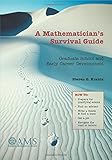http://www.amazon.com/Mathematicians-Survival-Guide-Graduate...
The author, a math professor, points out that a department has to keep up its enrollments to maintain departmental resources, and those resources include funding for more professors. He tells the story of one state university system that had a main math department in university's main college of arts and sciences (whatever the exact name was) and a set of first-year calculus courses for forestry majors taught by the School of Forestry. By university rules, all first-year calculus courses were deemed equivalent, and by reputation of the courses reported by students, the calculus courses in the Forestry School were the easiest calculus courses to pass. So of course over time the enrollments in the calculus courses for forestry students increased quite a lot, including many students who were not majoring in forestry. That kept the main math department from having the enrollments necessary to justify hiring more junior professors, more secretaries and graduate students, and so forth.
Another example he gives is of a different university where a department's offerings to non-major students were so irrelevant to their needs that a different department took over teaching those courses. In some state university, the engineering school wanted engineering majors to be able to take courses in Japanese to learn to read technical documents, but the Department of Asian Languages insisted on teaching courses in reading medieval poetry and the like. So the engineering school hired its own instructors of Japanese, with no tenure track, and taught its desired Japanese courses in-house, again denying the Department of East Asian Languages a chance to grow and to gain more resources.
University departments, unless they are very well endowed by a specific endowment, have to compete for resources by appearing to meet student needs. Students may not always take a long term view of what their own needs are for a good education, but enrollments matter in allocating resources.
See
http://www.amazon.com/Mathematicians-Survival-Guide-Graduate...
for tips on how to obtain an affordable graduate degree in mathematics without having to leave the United States.

My favorite book recommendation on the subject of career paths for young people considering pure mathematics:
http://www.amazon.com/Mathematicians-Survival-Guide-Graduate...
My oldest son is a math-liker who has been exposed to the pure mathematics research community through summer programs, and he (college-applying age) and I are currently pondering whether becoming a math professor is a better fit for him, or whether he will truly find paradise as a hacker starting a SaaS business.